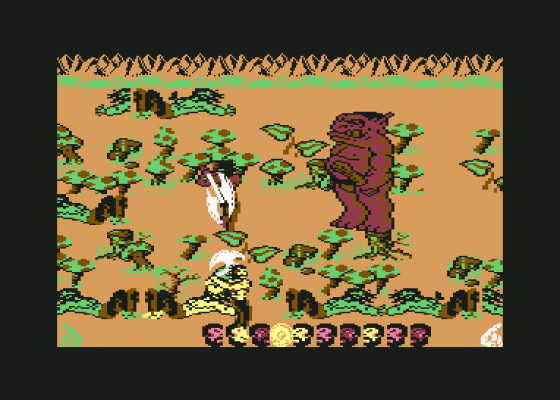
Commodore Format
 1st August 1991
1st August 1991
Categories: Review: Software
Publisher: Rainbird
Machine: Commodore 64/128
Published in Commodore Format #11
Betrayal (Rainbird)
Everything about this game is so impenetrable that now I come to write this, I don't know where to begin. I don't know why, for a start, I didn't beg somebody else to do it. Wait a minute, that wasn't fair. I wanted to play this game to start with.
You play a king wannabe who's only going to get to the top of a slippery ladder of power by standing in everyone else's face and climbing like crazy. Three others play against you with the same odds.
There are two bases of power, the king's court and the bishop's court. You want to get them both and the means to get one works for the other. You get them by filling them with people on your side. There's room for 24 people in each court and everybody in this backstabbing extravaganza starts with eight 'courtiers' present. Each courtier comes from a village. The village's allegiance is the same as its courtier... until it's vanquished in battle. Then its allegiance is that of the victor.

Each village generates wealth by producing crafts and crops. Squeeze production of these to the limit and you get hard cash. You raise tolls on your villages for more cash. You raise personal forces by recruiting from each town's militia, being sure to leave them with enough strength to defend themselves if attacked. When you put the pressure on a village, it starts to think twice about what it thought you were so good for in the first place. No problem. When you notice this (the village's pennants start coming down), put your foot down and hit them with a heavy dose of tyranny. Then, with the forces you've 'conscripted, attack other knights' villages and increase your power base.
Wait a minute, what about the others? What will they do and when will they do it? The game is split up into ragged subdivisions of turns and sub-tums, moves, clicks... (But look, don't worry. I've got to tell you now, my advice to you is never play this game.) Your enemies play to win and you simply have to play better. In practice, computer-controlled opponents follow their programming while you desperately try to find something in the manual or on the screen that makes sense.
I could just say, "It's like medieval Supremacy but they've made a complete hash of it". But I thought this game might have been better than Supremacy. Anyway, you're generating all this cash so you can put big wads in front of the king and bishop. There's a minimum payment to make to avoid a penalty.
You have to spy on your opponents. As they're all doing what you're doing, it's easy to gather evidence (I mean there's plenty of evidence around - nothing is actually easy to do in Betrayal). *But they will do it to you*. The idea in this game is not to hold back. Nice, isn't it?
What we're here for is a challenge. But the point, or rather the disappointment, is the other challenge, the one they don't tell you about in the manual. It is the manual. Its lack of definitions, order and clarity. It's on the untidy screen in the form of mysterious icons, some never explained. It's even in the collision detection which proves to be a last ditch defence to stop you from doing to stop you from doing anything to affect the running program even when you've figured out what it is you want to do. I could go on but with only one good feature to mention, why should I? Steer clear, or you'll feel... well, take a guess.
Good Points
- Interesting arcade combat.
Bad Points
- The 90 page manual tells you what's at the heart of the game but completely fails to make the mechanics clear. It leaves whole areas unexplained, others explained badly and most in the wrong order.
- The controls don't respond well at all. You can spend minutes trying to get a response from a single click.
- Presentation is inconsistent and needlessly confusing.
- The multi-player option is guaranteed to cost you friends.
- With information being so hard to physically access, the drawn-out gameplay just doesn't make it worth the effort.
- The graphics are as tedious as sin.
- A bug sometimes causes the game to crash immediately after loading!











